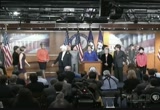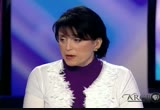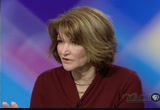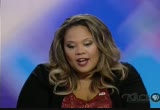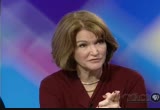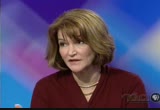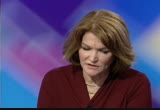tv To the Contrary With Bonnie Erbe PBS November 17, 2012 11:30am-12:00pm PST
11:30 am
11:31 am
connection to the world economy. behind the headlines -- marianne williamson on changing the way women talk about politics. hello, i'm bonnie erbe. welcome to "to the contrary," a discussion of news and social trends from diverse perspectives. up first, women make waves in congress. flanked by the democratic women of the upcoming 113th congress, nancy pelosi ended speculation that she might step down as house minority leader. >> in order to continue to work on empowering women, to making sure our affordable care act is enforced in a way that no longer
11:32 am
being a woman be a preexisting medical condition. [ applause ] to work with the president to create jobs and grow our economy in a way that empowers women in the workplace. and i have made a decision to submit my name to my colleagues to, once again, serve as the house democratic leader. [ cheers and applause ] >> a record number of women were just elected, many of them democrats. the house now has 78 female members, 50 democrats, 28 republicans. they came to washington for orientation and to get ready for the upcoming session. >> i think they'll kick some of those issues down the road so when we get back we'll have to look for long-term solutions for job creation, making the tax structure fairer and the appropriations, i think that
11:33 am
will be the first order of business, but it will still all be tied to the economy. >> i think you will see us working hard to move the legislation and bring a bipartisan approach to the environment. i'm not pessimistic about those opportunities and i think that there is a brand-new sense of hope and a renewed sense of urgency. on the other side of the aisle, >> on the other side of the aisle, republican cathy mcmorris rodgers won a hard fought battle becoming the house republican conference chair. that means there will be at least one woman in the house gop leadership. so, bay buchanan, are democrats and republicans sending the message that women's voices will be heard in the upcoming congress? >> it's wise politics to make sure your women are prominently displayed within your party and leadership and in other different roles. >> i think women r sending their own message they're asserting
11:34 am
their own power through congress, whether through voting, women asserting in congress or on both sides of the aisle in leadership, women are asserting their own power. >> when you have a presence, you will be heard. so it's now women have a strong presence in the congress and they will be heard on either side of the aisle. >> let's not forget, this is inadvertent, not deliberate. the g.o.p. house chairwoman, she won that on her own steam, even though the vice presidential candidate put up a candidate against her and those women got elected from the democratic party side of the aisle. the party didn't decide wanted more women in congress. they worked their tails off to get the positions. >> so you're saying the parties are not doing enough to help women. >> let's not get -- >> even nancy pelosi, she raised $85 million. >> no, nancy pelosi is incredible, but the truth of the matter is there is a unique lack of political will in this country to see women advance
11:35 am
politically. let's not get excited. we saw an increase of 1.5% of women representing us in congress. that's not a critical mass. we're banked 95th in the worked in women elected to office. we have a long way to go. >> what kind of change will the new women make? they're overwhelmingly democrat. >> that's right. >> some replaced tea party members in the house of representatives, but there are still 50-plus tea party members in the house. how will the women predominantly progressive come up against the tea party? >> all research shows you need 30% of women in any given body for them to actually constitute a critical mass so they can really start moving forward to things that matter to them. now, is every advance we make important and valuable? unquestionably. to have the g.o.p. to have at least one woman in their leadership, perfect. to have nancy pelosi continue in leadership, perfect.
11:36 am
but, again, we have a long way to go. >> this isn't the first time republicans had a woman in leadership. cathy mcmorris rodgers, she earned it, too. and she's a great representative, and i'm glad she won that position because does the g.o.p. have a female problem as far as, clearly the election showed that, there is a gender gap. so we have very capable women representatives, so why weren't their voices heard and why weren't they more visible and now there is an opportunity because as conference chair, her job is to be the messaging apparatus of g.o.p. leadership, and this is a woman who -- >> but let me ask you, should the -- i know g.o.p. women in general will say we're no different from the men, our issues are no different, we're no different. on the other hand, there is a major, you know, woman problem. there were things, even what's -- bush's former advisor now in texas, karen hughes, came out and saidly cut out -- i will
11:37 am
cut out the tongue of any g.o.p. politician male who starts talking about rape unless they're saying it's a horrible thing and, you know, we've got to end it. so, you know, with a woman in fourth place in their leadership, with 20 females in the u.s. house versus 58 democrats, is the republican party doing enough of a job to review and promote women? >> well, and you might want to add, there are five female governors in the country, four of which are republicans, doing great jobs out there and very well respected in their states. so what are we doing? i think with cathy mcmorris rodgers, she ran, it's a tough battle and she won and gets the credit but she got men to support her. there is a sense in the republican party tom price is a good man, she's a terrific lady, but maybe it would be wiser for her to have that position. >> a better messenger. >> a better messenger is a
11:38 am
perfect way to put it so in a sense, it's the party coming together realizing we need to make certain these women are prominently displayed, out there helping us send a message to this country that we represent both men and women. >> avis, your thoughts. the burden on the republican party from where i sit is to get more women in the house, more women in the senate and more women higher up in the leadership. on the other hand, democrats are talking that, you know, nancy pelosi was too old, she should step down. i thought it was hysterically funny that had she stepped down as minority leader she would have been replaced by the pup who's 73 years old. was there ageism going on? >> that wasn't the democrat, that was the reporter. that was raised and a number of democrats were offended by that
11:39 am
being raised. but there are women and we're seeing growth in that area and it behooves both parties to outreach to the women because women make up the majority of the electate. >> what will we see in way of change in floor votes? you work in the house. are there enough new democratic women to change how things work in the house now? >> no, because they're not in the majority. republicans control the floor, we control the agenda. that's just the way it is. i think there is an opportunity, though, for some major issues where there needs to be compromise, common ground, having women at the table talking to each other. it's a different dynamic when you have women working with women. i think there you may see movement, but as far as major policy, probably not. it's such a highly politicized environment right now politically with the fiscal cliff, s se quest tration.
11:40 am
>> there is a real value to the republican party to having women running and people can embrace and support. ly speak with authority that the rep women my organization supported that went into the primaries were attacked by their own party. so the republican party has work to do to make sure women are supported in the way they need to be when they run. >> i don't know which particular races you're talking about. could have been that they didn't properly represent their district as republicans, i don't know, and then they would have been attacked by their opponent. that's part of the deal when you run for office. >> not by the opponent, attacked by the parties. >> well, in the primary the party obviously supported the other candidate. the point is i don't believe you will ever see an equal number of women running as men. i don't think this politics is the kind of business that
11:41 am
attracts women in the same way as small business. women want a sense of security, they want flexibility, they want to be close to their families, they don't want to travel all the time. in addition to that -- >> but it's -- >> it's a very contention business. how many congressmen i know live in their offices, live there, and their wives and children are home. do you know many women who would live in their campaign office? >> live in their congressional office. we actually interviewed a new congresswoman from ohio, beatty, and she said there is no way she would do that. >> you just repeated every single misnomer. you're wrong. i'm sorry. now, women -- do women run for different reasons? absolutely. men run because they see it as power. women run because we want to change the world and what we have to do, all of us as well leaders, what we need to do is encourage women to run.
11:42 am
when women run they run at equal rates as men and raise as much money. a guy wakes up and says, i see a senator! women have got to be encouraged. that's the big difference here. >> women have considerations about children and their role in the family, child beang age. i want to run for office, but i've put that off because i want to have a family, have children and then run because of how difficult that life is. >> but, wait. one last question and we're out of time. the democratic party in the house is now minority white men. >> that's right. >> what does that mean? >> well, what that means is, inadvertently, the democratic party has done a much better job of encouraging minority and women and part of that is due in part to emily's list, our organization, the mgos helping
11:43 am
women to run in the democratic party. debbdeb wasserman schmidt. no man wakes up and says i have small children and won't run. we should encourage them. >> we should ask them to make the best decisions for their own family. some say it's best for my family i can stay home. some say it's not, my husband can go. >> i disagree and think we should encourage all women leaders to run. >> follow mtoll on twitter. a new united nations priority says access to contraception could boost the
11:44 am
world's economy by billion. the report finds inadequate family planning in developing countries contribute significantly to poverty and poor health. contraceptives cut the chances of a woman dying in childbirth by a third. the u.n. report also describes other benefits, the rise of women in the workforce and wealthier households. some 222 million women currently have insufficient access to contraceptives and $5.7 billion could be saved, preventing unintended pregnancies and unsafe abortions. dr. avis jones-deweever, how does the u.n. come up with this $5.7 billion figure? >> if you look at certain developing nations, there is not good access to contraception. that cost money in terms of healthcare, lack of productivity of an untapped human capital resource. >> and maternal and childbirth -- death, rather, and complicated births?
11:45 am
>> exactly. having access to contraception allows women to not only space their children, decide when they will have their children, as well as stay in school, get educated, get a good job and save their lives due to unneeded complications in childbirth that they wouldn't have gone to had they had access to affordable contraception. >> this is clearly the report i don't think you can argue. you can argue with the numbers but not the facts. you have to also take into consideration, one, where is this money coming from that would provide the contraception worldwide. number two, there is religious and cultural issues in many countries around the world that would make it very difficult if not impossible to have that money and the contraceptions reach the women you want them to reach. so this is not a simple, hey, here's an answer to the problems. >> in algeria, i visited refugee camps and these people have been
11:46 am
in refugee status for 37 years and they are 95% literate and it's an all muslim ethnic group and they're not going to take too kindly to the u.n. coming in and trying to promote contraception because that's not what their religious beliefs allow, but yet they've managed to educate their girls and they have great school programs despite being refugees, they're working it out. hopefully they'll get they are referendum vote. anyway -- >> i've also gone to many countries overseas to do reporting on how usida money was being spent. in morocco, i went to a pediatric clinic that was underwritten by usaid funding and, first of all, they were not giving abortions because it was against the law in morocco and they certainly abided by whatever the local culture is. secondly, it was the only medical clinic for hundreds of
11:47 am
miles. i saw women showing up there with three and four kids, toddlers, you know, babies in their arms, toddlers on their hands. they were getting family medical care there. so should we be funding it? >> i think to your point, bonnie, what this represents unequivocally is something that everyone, all the different research has been coming together internationally and coming to a point. this is a fantastic move on the u.n.'s part because the truth of the matter is, every dollar spent on assisting women with their reproductive needs is one of the mt strategic and leveraged dollars you can spend internationally. if the concern is to make sure we're spending dollars well, it's proven there is no better way to put your money in any country than this exactly. international economists point to the fact the single most pre-indicator of a developing nation's likelihood of succeeding is whether it's women have access to reproductive choices and options. so what i'm thrilled by is
11:48 am
making access to contraception a human right, and i think what we have to really commend the u.n. for is they go out with these kinds of statements and research and what ends up happening is -- do you know the reason so many nations have quotas and we don't? because the u.n. identified if you have more women in politics, the countries benefit. so i think this is wonderful. >> it's important to note also this report says it does not include abortion because abortion, they believe, is harmful to the health of women. amen to the u.n. on that point. >> i didn't see that point. >> in fact -- wait, wait, wait. >> maternal mortality increases by a third because women don't have access to safe abortions. behind the headlines: marianne williamson. the best-selling author and motivational speaker is trying to change the way women approach politics.
11:49 am
>> i think it's worth asking ourselves, would our social policies, both domestically and internationally, be so tilted in the direction of providing for those who already have if there is anywhere near gender equity among our elected representatives. and i think not. so, i think that the frustration i feel about these things is shared by millions and millions of people. >> williamson has teamed up with the women's campaign school at yale university to launch sister giant, a movement to engage women who wouldn't usually consider running for office or even working on a political campaign. she is not advocating for either political party. rather, she's asking women to think about changing the future of our country by focusing on those issues we didn't hear about during the past election. >> we have 23.1%ercent child poverty rate and that among 35 developed nations in the world we are second highest only to romania. we have the highest incarceration rate in the world, we not only incarcerate more
11:50 am
than any other country of our people, but we also incarcerate more of our people than any nation in history. we have 46 million americans living in poverty. and of course we have indirect, if not direct threats, to democracy itself in the form of things such as a supreme court united, citizens united decision. >> the citizen's united supreme court case aowed unrestricted campaign spending by corporations and unions. the recent presidential race is the first to have political action committees with unlimited funds attempting to influence voters with ads. williamson is one of the many who say this is the wrong direction. >> because as long as you have a politics that has basically been almost taken over by monied interests, particularly making our elections more like auctions, then those who have no financial leverage will have no financial influence. excuse me, will have no political influence. and of course children represent no financial leverage.
11:51 am
so where is the voice going to come from? >> williamson hopes, through change, that voice will come from the american people, not large corporations. >> i believe that there are many people who wish to recreate the political field, a new conversation. and whether it finds a place now within politics as we know it, is almost irrelevant. you know, social justice, any kind of forward movement in society never occurs because a majority of people woke up one day and said let's do things differently. >> and how do we start to move forward? williamson thinks it's as simple as changing our mind frame about politics. >> we need to de-mystify politics. it's become this spectator sport. and it's not that the heart of the american people isn't good or decent. but like martin luther king used to say, the american people are more compassionate than the us congress and that's because they're not bought and sold by monied interests the way too often our law makers have to be
11:52 am
to get into office. >> so two things going on here. one, she's saying the electorate is influenced too much by mon idea interests and the next is motivating more women to get politically involved. starting with the first issue, there were billions of dollars spent on ads and by these super pacs. voters turnout was down by about 5% this year over the last time. but most to have the money was spent by supporters of mitt romney, and it didn't win the electorate. so should we be caring anymore? is it okay for them to be throwing their money away if they want to and the message not getting through? >> well, i felt it was a perfect example of free market economies, right? all the money that was spent -- what was it, $8 million -- i think it was $800 million, relative to $500 million on the
11:53 am
left. didn't work. the electorate made their voice known and i think what's particularly powerful is this is an election cycle where i think the american public, for the first time in a long time, said enough is enough all the horrible things that were being said about women, in fact, insured many women's victory because a vote for mccaskill was against the horrible things akin was saying. not so much a vote for donnelly, but a vote for the things his opponent was saying. so i think citizens united already demonstrated itself to not have the overweaning preemptive effect that was predicted. >> first of all, if you add at what both candidates spent, you're looking at a billion dollars each basically and they both decided how to spend the money.
11:54 am
i'm totally opposed to the pacs because the candidate should decide what the message is and to raise the money he can to promote the message. the super pacs do an injustice because they can't control the message. >> why bother -- first of all, a lot of the major donors, if they want to keep spending after this election, you know, more power to them. there are better ways to throw your money away. >> the candidate should be allowed to control the message they're sending to the american people and we shouldn't have to worry someone else is sending a different message about me and it looks as if it's mine. you get rid of the super pacs, bring it to the candidates and let the people support the candidate of their choice. >> super pacs. >> super pacs did not win, but the larger message is the american people want a different kind of politics, a politics not ruled by money but creates a
11:55 am
better humanity. that's a goal we can all strive for. >> i think it's more so the messengers. you have the freedom to express yourself in this country through politics. you have the media to generate attention to your cause. it's a freedom we enjoy in this country but i think the message in this campaign was more about the messenger than how they presented it as opposed to how much money was spent. >> i agree with that. but, if i could -- >> sorry, we're out of time. that's it for this edition of "to the contrary." please follow me on twitter at bonnie erbe and at tothecontrary and check our website, pbs.org/ttc, where the discussion continues. whether you agree or think, "to the contrary," please join us next time.
123 Views
IN COLLECTIONS
KRCB (PBS) Television Archive
Television Archive  Television Archive News Search Service
Television Archive News Search Service 
Uploaded by TV Archive on

 Live Music Archive
Live Music Archive Librivox Free Audio
Librivox Free Audio Metropolitan Museum
Metropolitan Museum Cleveland Museum of Art
Cleveland Museum of Art Internet Arcade
Internet Arcade Console Living Room
Console Living Room Books to Borrow
Books to Borrow Open Library
Open Library TV News
TV News Understanding 9/11
Understanding 9/11

